
Friday marks the 100th day of the Russian war in Ukraine, and the United States warns the war could continue for many more months. We speak with Anatol Lieven, senior fellow at the Quincy Institute for Responsible Statecraft. His latest piece for The Atlantic argues that the U.S. is right to support Ukraine in its fight against Russia; however, without a clear strategy for peace and ending the war, the U.S. is at risk of repeating the mistakes made during the Cold War, when “containment of the Soviet Union in Europe was turned into a global crusade against communism.”
Transcript
AMY GOODMAN: Friday marks the hundredth day of the Russian invasion of Ukraine. There appears to be little progress on talks to end the war. France, Germany, Italy are pushing for a negotiated settlement, but the U.S. and U.K. are rejecting such calls.
The Biden administration is now planning to sell Ukraine drones that can carry Hellfire missiles. This comes in addition to a U.S. plan to send Ukraine an advanced artillery rocket system that can strike Russian targets up to almost 50 miles away. Meanwhile, the head of U.S. Cyber Command has admitted for the first time the U.S. has carried out offensive cyber operations to help Ukraine.
In a new op-ed in The New York Times, President Biden writes, quote, “We do not seek a war between NATO and Russia. As much as I disagree with Mr. Putin, and find his actions an outrage, the United States will not try to bring about his ouster in Moscow.” He went on to write, “We do not want to prolong the war just to inflict pain on Russia,” unquote.
Russia has blasted the weapon transfers, saying the U.S. is, quote, “deliberately pouring oil on the fire.”
This all comes as Russia moves closer to seizing the Donbas region in eastern Ukraine. The governor of Luhansk says Russia now controls more than 70% of the key city of Severodonetsk. By capturing the city, Russia would control almost all of Luhansk.
In Washington, President Biden is meeting with NATO Secretary General Jens Stoltenberg at the White House. On Wednesday, Stoltenberg held a joint news conference with Secretary of State Antony Blinken, who said the war might continue for many months.
SECRETARY OF STATE ANTONY BLINKEN: We can’t predict how this is going to play out, when this is going to play out. As best we can assess right now, we are still looking at many months of conflict. Again, that could be over tomorrow if Russia chose to end the aggression. We don’t see any signs of that right now.
AMY GOODMAN: We’re joined right now by Anatol Lieven, senior fellow at the Quincy Institute for Responsible Statecraft, author of Ukraine and Russia: A Fraternal Rivalry, his latest piece in The Atlantic headlined “Cold War Catastrophes the U.S. Can Avoid This Time.”
Welcome back to Democracy Now!, Anatol. In your piece, you write that “U.S. policy today is in danger of making some of the same mistakes of the early years of the Cold War. The stage is much smaller, but the danger is, in some ways, greater.” Explain.
ANATOL LIEVEN: Well, I drew attention to the way that George Kennan’s vision of the containment of the Soviet Union in Europe was turned into a global crusade against communism, and the way in which conflicts that should have had nothing to do with the Soviet Union and Europe were portrayed as central to American security — I’m thinking of Vietnam in particular — but also the way in which, across the world, the United States lined up with anyone who called themselves anti-communist. And that, of course, led to a string of disasters. The United States overthrew a liberal nationalist in Iran, reinstalled the dictatorship of the shah, and eventually, of course, got the Islamic Republic as a result. American backing for right-wing coups in Central America led to what in other circumstances the United States would have called genocide. And, of course, at home, you have McCarthyism, whereby a really, actually, tiny communist presence and threat within the United States was portrayed as a threat to the American republic and the threat of a communist revolution, which has helped to poison, in many ways, aspects of American political life ever since.
So, what I was saying was, today it is entirely correct to help Ukraine to defeat and contain Russian aggression in Ukraine, but if this is turned into, instead, a kind of permanent crusade against Russia, this is both intellectually false, very dangerous for the United States and, of course, disastrous for any chances of peace in Ukraine, because it points, as certain Biden administration officials have suggested and as, of course, several European governments have suggested, that this must be a war not just to defend Ukraine but to impose a comprehensive defeat on Russia.
Now, why I say that this is, in some ways, more dangerous than in the Cold War is that in the Cold War both American and Soviet governments were very careful. Whatever proxy wars they waged elsewhere in the world — with, of course, horrible results in Africa and Asia — they didn’t wage them in Europe, because the threat of escalation to nuclear war was too great. Well, now, of course, we see a proxy war in Europe. And the danger, of course, if the West does aim for a complete defeat of Russia, is that there will be an escalation, not, I think, towards a deliberate use of nuclear weapons, but to what used to be called and should still be called brinkmanship. And, of course, the problem is, if you’re going for nuclear brinkmanship, there’s always a chance you’ll fall off the brink.
NERMEEN SHAIKH: Anatol, what indications are there — I mean, obviously, within Europe there are divisions now on how to deal with the invasion. France and Germany have been speaking regularly to both Putin and Zelensky. But is either side at the moment interested in negotiating a peace settlement?
ANATOL LIEVEN: Russia at this moment, I think, is not, because for Putin to be able to claim some sort of success in what has in fact been a disastrous war for Russia, Russia needs to occupy the whole of the Donbas region, because Russia, before the war, recognized the whole of the Donbas as independent from Ukraine. But so far Russia has not actually managed to conquer the whole of the Donbas. And although, as we heard a few minutes ago, Russia is close to capturing the whole of Luhansk region, it’s still very far from capturing the whole of the neighboring region of Donetsk. So, as long as the Russians think they can do that, I think they will go on grinding forward.
But either if they can capture the whole of the Donbas or if they are in fact, which is also entirely possible, simply fought to a standstill in the Donbas, then I think there is a good chance that Russia will in fact offer a ceasefire and peace negotiations, simply because they have lost so many men and so much equipment. And, of course, if they go on and on losing at this rate — of course, Ukraine is also losing, but Ukraine is getting a great deal of help from the West. So, at that point, I think that there will be a chance of peace negotiations, but not today.
NERMEEN SHAIKH: But, you know, even if — as you point out, of course, the war has been disastrous for Russia, and despite arms shipments to Ukraine, the war has also been disastrous for Ukraine. And it’s unclear the extent to which Zelensky has offered — made reasonable offers towards a peace settlement with Russia, as recently as last week saying that Ukraine would be willing to accept a preinvasion status quo — that is, relinquishing the desire to reclaim annexed Crimea. Could you talk about that? I mean, what is Zelensky’s position? And what is the hesitation on Russia’s part to agree to this? Is the idea that Russia wants to, as is happening now, take more territory in the east and will not agree to a settlement until they’ve done so, that Russia is not willing to simply go back to preinvasion lines?
ANATOL LIEVEN: Well, as I said, I think — well, quite obviously, Russia is trying to take the whole of the Donbas region. Russia has, I think, quite clearly abandoned hopes of conquering the whole of Ukraine or reducing the whole of Ukraine to a — again, to a Russian dependency. I mean, that’s gone. The Russian army is just not capable of it.
As far as the signals from the Ukrainian side, however, these have been extremely mixed, and Zelensky himself has given mixed signals, you know, on a week-to-week and sometimes even a day-to-day basis. The thing is, though, that Zelensky has not offered to recognize the Russian annexation or Russian sovereignty over Crimea or the independence of the Donbas separatist republics in the territory they held before February. He has said that these issues could be compartmentalized and negotiated, but he hasn’t said Ukraine will agree to give them up.
My sense is that, as I say, given how much Russia, you know, the Russian army, has lost in this war, if Zelensky would offer — I mean, it would have to be wrapped up, of course, as referenda under international supervision and accompanied by a treaty of neutrality, but if Zelensky were to offer that, it might be enough for Putin to claim success, because, obviously, I mean, if you’re going to get the Russians to agree to a settlement and withdraw from all the additional territory they’ve conquered, then — you know, I know this is very, very difficult for Ukraine and, indeed, the West to offer, but as Henry Kissinger and others have said, you have to give Putin a way out. You have to give him some opportunity to claim that Russia has gained something through this dreadful war. That, however, is where — well, obviously, the question of whether you actually want to give Putin a way out comes up, and it is over that issue that problems between some of the Europeans — the French, Germans, Italians, as you say — and America and Britain could emerge in the weeks and months to come.
AMY GOODMAN: And what difference would it make if the U.S. changed its position? I wanted to get your comment on the latest weapons that are being sent there. And Henry Kissinger, the former secretary of state, known for supporting coups from — oh, from Chile to the murderous regime in Argentina to Vietnam, was pushing Zelensky, offering global criticism, saying he should offer some land or agree to some land concessions. In fact, although Zelensky firstly attacked Kissinger, Zelensky himself has said this over and over. He seems to be changing his position. But as the major weapons dealer to Ukraine, what role exactly could the U.S. do? What exactly is it doing wrong right now?
ANATOL LIEVEN: I think that what the United States is doing wrong is not accompanying the supply of weapons — but, of course, perfectly legitimate — with a serious negotiating strategy and a peace plan. Instead, the Biden administration has repeatedly said, “Oh, you know, this is purely a matter for the Ukrainians.” Well, of course, naturally, the Ukrainian government would have to sign any agreement, but the United States is running big risks for the American economy; huge risks for the global economy, if you look at food price inflation; huge risks for global instability, as a result of food shortages. We see what’s happening to the energy markets. But also, of course, the United States is running a nonnegligible risk of nuclear war. This is the biggest danger of nuclear war that we have seen since the Cuban Missile Crisis 60 years ago. And, of course, the United States and NATO, you know, backed and encouraged by the United States, has played an absolutely critical role in arming and helping Ukraine. I mean, despite all the courage of the Ukrainian forces, they would not have been able to stop the Russians if they hadn’t also received so many Western weapons and so much U.S. intelligence, of course, to help them. So, all of that gives the United States a right — and also, I would say, a duty to the American people and the Western alliance — to come up with a peace plan of its own.
Now, there’s another reason for this, which is, as you say, Zelensky has suggested, stated, sometimes ambiguously, because sometimes then he’s appeared to go back on it, as you said, but a set of basically reasonable proposals for a peace settlement. Other Ukrainian officials have taken an absolutely opposite line and said that, you know, Ukraine must drive Russian forces out of all the territory that Russia has held since 2014. Now, the point is that if Zelensky’s line is to prevail — you know, nobody is looking at Ukrainian internal politics, but if Zelensky’s line is to prevail, he will need strong American backing, you know, against his own hard-liners.
I would also say, by the way, that this has a relationship to the kind of Ukraine we want to see after the war. You know, Zelensky is a great wartime president, but he’s also, by tradition and origin, a liberal and a civic nationalist. That’s what we want to see prevail in Ukraine. That’s what will have to prevail in Ukraine after the war if Ukraine is to move towards membership of the European Union. Now, there are other forces in Ukraine, as we know, very brave men — no question — tremendous self-sacrifice on their part, but their idea of Ukrainian nationalism would be a disaster for Ukraine and would make it impossible for Ukraine to join the West. So there’s also a long-term political strategy involved here about what kind of Ukraine we want to see.
NERMEEN SHAIKH: Anatol, finally, you know, the Russians have, of course, condemned this new deal, the military equipment that the U.S. is now providing. And you’ve spoken just now and we’ve been speaking of the various proposals that the Ukrainians, if unevenly, have been presenting for peace. What are the terms that Russia has proposed for a peace agreement, if indeed there has been one? What are the terms under which they would cease fighting and even withdraw from parts of Ukraine?
ANATOL LIEVEN: Well, some of Russia’s terms have been very clear: a treaty of neutrality, which, by the way, Zelensky himself has also proposed, because, as he said, NATO has repeatedly refused to make an early offer of NATO membership for Ukraine, so why not a treaty of neutrality? Now, of course, the details of that and the guarantees Ukraine has asked for as part of that are something that would have to be negotiated. But that’s the first thing.
Then Russia has asked for denazification, but not always. Sometimes Russia has appeared to drop that demand, then it’s come back again. There’s been ambiguity on the Russian side, as well. It could be, however, that after capturing Mariupol and largely destroying the Azov Regiment, which Russia has identified as the principal, what it calls fascist force in Ukraine, that Russia could claim that it has done that itself. So it’s not clear whether that will be an obstacle.
Then there have been demands for guarantees for the status of the Russian language in Ukraine and that Ukraine should withdraw laws passed over the past couple of years basically abolishing the Russian language from public life, education, government in Ukraine and from the media. That, it seems to me, is something that the Ukrainians should do in any case and without reference to Russia, simply because the Russian and Russian-speaking population, completely contrary to Russia’s obvious expectations, has overwhelmingly remained loyalty to Ukraine in this war. They deserve recognition of that. This also relates to what I said about what kind of Ukraine we want to see in the future. We obviously want a civic nationalist Ukraine, not an ethnic nationalist one.
Finally, though, the great sticking point, Russia has demanded recognition of Russian sovereignty over Crimea, which Russia annexed in 2014, and recognition of the independence of the Donbas within the full territory of the Donbas, which Russia does not yet fully occupy. Russia has not yet made any demands about the additional territory it’s conquered in southern Ukraine, so that, you know, is not actually on the table. So, we presume that Russia would be willing, in principle, to abandon new territory it’s conquered, to withdraw, if enough of its other demands were fulfilled.
But Russian demands are very clear. These remain Russia’s formal demands. I mean, the details aren’t, but, in principle, you know, the main demands are. So it would be — you know, the task of diplomacy is somehow to bring together what Zelensky has offered and what Russia has demanded. Obviously, both sides will have to give something if there’s to be an agreement.
AMY GOODMAN: Anatol Lieven, I want to thank you for being with us, senior fellow at the Quincy Institute for Responsible Statecraft, author of Ukraine and Russia. His latest piece in The Atlantic, we’ll link to, “Cold War Catastrophes the U.S. Can Avoid This Time.” He’s speaking to us from Leicester, England.
Next, we look at an issue seldom discussed: the role of the United States as the world’s leading exporter of weapons. Stay with us.

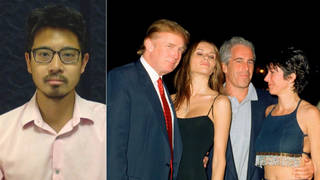
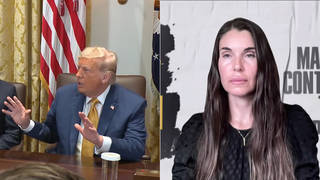
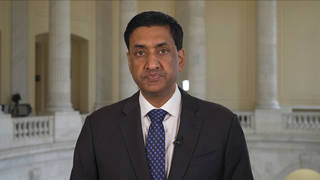
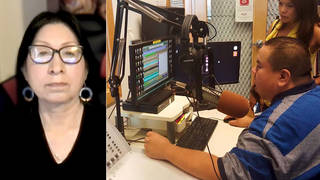





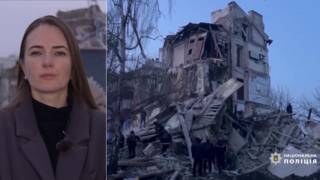

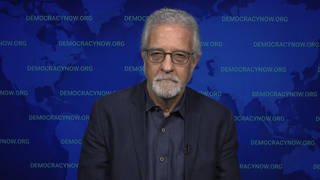
Media Options